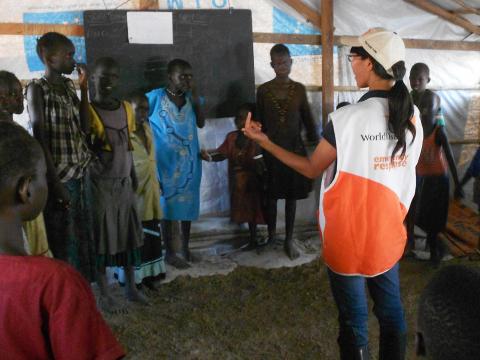CRC@25: Children’s right to be protected needed most in emergencies

As we celebrate and commemorate the 25th Anniversary of the Convention of the Rights of the Child (CRC), I cannot help thinking about the children who face dangers and survival risks as we speak now.
More than 1 billion Children live in the conflict affected areas, of which 300 million are under the age of five[1]. Children constitute around 50% of the world refugees (of 16.7 million), which is the highest figure for the decade[2]. More than 28.5 million children are out of primary school in the conflict affected areas, and there are 250,000 child soldiers[3].
While we made great progress in realizing children’s rights worldwide, unfortunately these facts and figures show the hard reality for children affected by conflicts today. Through my deployments in emergency responses, I witness and listen to their fears, sadness and anger. Like Teresa and Simon who shared their story in the report of “Sounding the Alarm the urgent needs of children in South Sudan[4]”, many children fled their homes avoiding the danger of attacks, face uncertainty in their life relying on aid supplies for their survival, and do not have any place to learn, play and meet with their peers.
The CRC, which has near-universal ratification across the world should be used to leverage the better protection of children effected by conflicts. Keeping the governments and parties to the conflict accountable, and reminding key stakeholders such as donors, humanitarian organizations for their commitment to ensure children’s rights are protected in the most devastating situation.
At the same time, CRC can also provide platform for children to share their views, voices and desire for their future, recognizing that children have a right to participate and to be involved in their own development and protection. Though children face the indescribable hardships, I was stunned to witness their great resilience and desire for the better future.
Children desire to go to school to better equip themselves with knowledge and skills. Children do want to contribute in their families and communities to make situation better. Children have a strong desire to have safe, peaceful country where they can happily live with their families and friends without fear.
Children are capable, according to their age and maturity, to contribute with their own resources, skills and knowledge to bring the positive changes in their peers, families and communities. These children will be the next generation to change and reconstruct their nations with peace and hope.
As we commemorate the 25th Anniversary of CRC, it is my prayer that people remember and recommit to protect the rights of the children in conflicts, who are trying their level best to survive and desire to build better future for themselves and everyone else.
Discover World Vision's CRC@25 blog series.
About the Author
Makiba Yamano is Child Protection in Emergencies Specialist in World Vision International. She has been working for children affected by natural disasters and conflicts across Asia, Africa and Middle East over 10 years. She spends half of her time in the emergencies responses, and another half for program quality assurance and capacity building for child protection in emergencies across the World Vision Partnership.
[1] Children in Conflict Fact Sheet, ECHO, 2014 http://ec.europa.eu/echo/files/aid/countries/factsheets/thematic/children_conflict_en.pdf
[2] War’s Human Cost UNHCR Global Trend 2013 http://www.unhcr.org/5399a14f9.html#_ga=1.116936707.425434296.1416203810
[3] Children in Conflict Fact Sheet, ECHO, 2014 http://ec.europa.eu/echo/files/aid/countries/factsheets/thematic/children_conflict_en.pdf
[4] http://www.wvi.org/south-sudan-crisis/publication/south-sudan-hunger-crisis-sounding-alarm